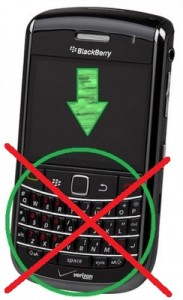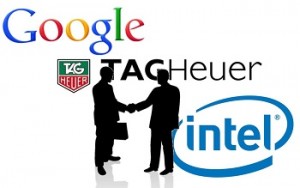The Canadian handset maker has dumped their physical QWERTY keyboards to attract new users.
While other smartphones from the Canadian manufacturer will continue to have the distinctive physical QWERTY keyboards, the latest device to be launched, the BlackBerry Leap, is losing this feature in favor of touch screen typing.
The goal is to be able to help the brand to appeal to younger professionals who are used to this mobile experience.
The BlackBerry Leap has been designed with younger professionals in mind. While the company is still focused on the business world as opposed to the consumer market, it has recognized that people under a certain age are comfortable functioning with a touch screen keyboard. Therefore, they have dropped the keypad for this device, in order to help them to compete with the Samsung Galaxy 6, the Apple iPhone 6, and other popular premium devices within the business community.
The BlackBerry Leap has also had a much more attractive price tag associated with it, to improve its appeal.
 Unlike its notably more expensive competition, the retail price for the new Leap smartphone is set at $275. That is about half the price of the Galaxy S6 and the iPhone 6. The device, itself, had previously been launched, but more information was revealed in order to help to boost the hype surrounding its release, which will be in April.
Unlike its notably more expensive competition, the retail price for the new Leap smartphone is set at $275. That is about half the price of the Galaxy S6 and the iPhone 6. The device, itself, had previously been launched, but more information was revealed in order to help to boost the hype surrounding its release, which will be in April.
That said, there is still some mystery surrounding the device. While it is known that the Leap mobile device will still include the enterprise management and security tools and features that have become synonymous with BlackBerry smartphones, the nature of the keyboard for this device has not yet been made completely clear.
These smartphones will still have built in protection against malware, backup features, as well as wipe and restore capabilities. Owners of the BlackBerry Leap can also expect to take advantage of some of the company’s apps, such as the Blend, which gives users the ability to access their smartphone content with their tablets and laptop computers. The company has been taking a number of new tacks to work its way back into relevance within the business market.
These companies have banded together to be able to launch luxury wearables before the year is done.
The Baselworld Watch and Jewellery Show in Basel, Switzerland was hyped with announcements about wearable technology, such as the luxury smartwatch that is expected to result from a new partnership among Google, Intel, and the TAG Heuer Swiss watch-making company.
The goal of the companies is to create a device that is both practical to the wearer, as well as luxurious.
The CEO of TAG Heuer, Jean-Claude Biver, said that “Silicon Valley is Switzerland, Switzerland is Silicon Valley.” He pointed out that the device that the partners would be designing would be “both luxurious, and seamlessly connected to its wearer’s daily life.” He closed his announcement with a ceremonial slicing into an 80+ pound wheel of cheese from his own farm.
Biver’s statement showed that the smartwatch is the latest component of watch-making innovation.
 He explained that by bringing together the technology of Silicon Valley and the watch-making of Switzerland, it is a “marriage” of innovation and credibility. He expressed that “Our collaboration provides a rich host of synergies, forming a win-win partnership, and the potential for our three companies is enormous.”
He explained that by bringing together the technology of Silicon Valley and the watch-making of Switzerland, it is a “marriage” of innovation and credibility. He expressed that “Our collaboration provides a rich host of synergies, forming a win-win partnership, and the potential for our three companies is enormous.”
The companies have yet to name the wearable technology device that they intend to launch, but they do know that a chipset designed by Intel will be powering it, it will operate on Android Wear (the modified version of the standard mobile operating system from Google), and TAG Heuer will be designing the actual watch that will be worn by the owner. The availability and pricing of these wearables was also not revealed, but Biver did state that it could be launched anywhere between October and December 2015.
While TAG Heuer will be designing the watch, because of the smartwatch components of the device and as a result of the international method of assembly and manufacturing, the smartwatch that these companies will be producing will not have an actual “Swiss-made” timepiece certification. That said, it will be enhancing the early entry of Google and Intel into the very promising wearable technology marketplace.
 Unlike its notably more expensive competition, the retail price for the new Leap smartphone is set at $275. That is about half the price of the Galaxy S6 and the iPhone 6. The device, itself, had previously been launched, but more information was revealed in order to help to boost the hype surrounding its release, which will be in April.
Unlike its notably more expensive competition, the retail price for the new Leap smartphone is set at $275. That is about half the price of the Galaxy S6 and the iPhone 6. The device, itself, had previously been launched, but more information was revealed in order to help to boost the hype surrounding its release, which will be in April.
 He explained that by bringing together the technology of Silicon Valley and the watch-making of Switzerland, it is a “marriage” of innovation and credibility. He expressed that “Our collaboration provides a rich host of synergies, forming a win-win partnership, and the potential for our three companies is enormous.”
He explained that by bringing together the technology of Silicon Valley and the watch-making of Switzerland, it is a “marriage” of innovation and credibility. He expressed that “Our collaboration provides a rich host of synergies, forming a win-win partnership, and the potential for our three companies is enormous.”